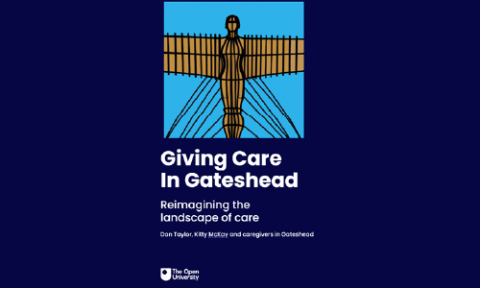Giving Care in Gateshead: GCSJ-backed film and research

Unpaid care is a social and political issue, and to some extent even a question of social justice. Since late 2022, Dan Taylor has been working on a UKRI-backed knowledge exchange project in Gateshead, a town in North-East England, to understand how unpaid caregivers can be better supported and enabled to thrive.
What is the secret ingredient that has allowed homo sapiens to survive, thrive and extend across the globe over 300,000 years, from small bands of hunter-gatherers to the industrialised just-in-time economies of today? Some would point to technology, from fire to the steam engine, others to some innate spark of curiosity. But there is another component: care.
Care, the provision or gift of what is needed for the protection, health or well-being of another, is probably universal to all societies. Beneath common aspirations for individual autonomy, control and strength are the fundamental features of our vulnerability, fragility and states of dependence, from earliest childhood to later years.
Care, what is given to another, in turn becomes wrapped up in complex emotions and values of love, duty, obligation, as well as societal pressures. Because care is also political. Wrapped up in care are assumptions about the cost of giving care, e.g. in welfare benefits, arranging substitute waged care work, or other forms of social support. Being an unpaid caregiver, say to keep a frail elderly parent or disabled child safe, is a highly skilled and time-consuming role that often results in caregivers giving up employment, losing out on financial security in the present and the future, and instead turn to access, where available, local specialist support. The giving of care disproportionately falls on women, often older women, reflecting social attitudes that raise questions about equity and fairness. Then there is also much greater incidence of unpaid care in areas with higher rates of multiple deprivation. In other words, unpaid care intersects with gender, age and poverty. Unpaid care is therefore a social and political issue, and to some extent even a question of social justice.
Our Project
Since late 2022, I have been working on a UKRI-backed knowledge exchange project in Gateshead, a town in North-East England, to understand how unpaid caregivers can be better supported and enabled to thrive. I have worked in partnership with Gateshead Carers Association, a local community charity supporting unpaid carers. Over my project I worked closely with 15 caregivers in Gateshead, using interviews, reflective tasks and focus groups to understand current levels of support for disabled and frail people and their caregivers, and to bring together ideas for transforming and improving the landscape of care.
To coincide with Carers Week 2023, we published a report and film called Giving Care in Gateshead with a public community launch event.
With backing from the Centre for Global Challenges and Social Justice, we were also able to produce a film that uses carers voices and lived experiences to set out a new approach to supporting unpaid carers.
Three Findings
The report and film highlight three things:
1. No more unpaid carers: Carers are being hammered by the cost-of-living crisis. Many need carer-specific financial support. Current forms of support e.g. Carers Allowance are failing many. We suggest what and how.
2. No more unsupported carers: Many unpaid carers are struggling with their care responsibilities and managing their own health conditions. Caring is a public health issue.
Unpaid carers need more support to continue in their roles, e.g. more respite services, greater availability of care workers, more support with care worker charges. Many haven’t had basic training in what are very skilled roles. There also needs to be a sea-change in working relationships and partnerships with health and social services in supporting cared for people.
3. No more invisible carers: Many unpaid carers are at the end of their tether. They feel taken for granted and invisible at a local and national level. Some that we spoke to talked about going on strike or walking out. While that will never happen, unpaid carers need greater formal and legal power at a local and national level. This will improve decision-making related to carers and disabled people as well as improving support and recognition for unpaid carers.
Giving Care in Gateshead 2023
Watch the community launch event here including a poetry reading and short talks from unpaid carers, and a short talk introducing the work:
Giving Care in Gateshead - 2023 Research Project Event
Read the full report and executive summary here:
The report has been distributed by national carers organisations including Carers UK and Carers Trust, who praised it as a “high quality example of how to do qualitative research”; and has led to current partnership work with Gateshead Council Adult Social Services; I have also been asked to become a trustee of the local carers organisation and have briefed local MPs.
To discuss any aspect of the research please contact me, Dan Taylor, lead investigator at The Open University.
Keep up-to-date with progress via the Caregiving in Gateshead.:
